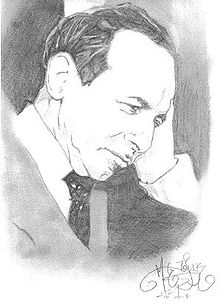Kalecki
| Michał Kalecki | |
|---|---|
 |
|
| Born |
22 June 1899 Łódź, Congress Poland |
| Died | 18 April 1970 (aged 70) Warsaw, Polish People's Republic |
| Nationality | Polish |
| Field | Macroeconomics |
| School or tradition |
Neo-Marxian economics |
| Alma mater | Gdańsk Polytechnic |
| Influences | François Quesnay, Karl Marx, Knut Wicksell, Mikhail Tugan-Baranovsky, Rosa Luxemburg, Joseph Schumpeter |
| Contributions | Business cycle theory, monetary theory, profit equation, theories of mark-up and effective demand |
Michał Kalecki ([ˈmixau̯ kaˈlɛt͡ski]; 22 June 1899 – 18 April 1970) was a Polish economist. Over the course of his life, Kalecki worked at the London School of Economics, University of Cambridge, University of Oxford and Warsaw School of Economics and was an economic advisor to the governments of Poland, France, Cuba, Israel, Mexico and India. He also served as the deputy director of the United Nations Economic Department in New York City.
Kalecki has been called "one of the most distinguished economists of the 20th century" and "likely the most original one". It is often claimed that he developed many of the same ideas as John Maynard Keynes before Keynes, but he remains much less known to the English-speaking world. He offered a synthesis that integrated Marxist class analysis and the new literature on oligopoly theory, and his work had a significant influence on both the Neo-Marxian (Monopoly Capital) and Post-Keynesian schools of economic thought. He was one of the first macroeconomists to apply mathematical models and statistical data to economic questions. Being also a political economist and a person of leftist convictions, Kalecki emphasized the social aspects and consequences of economic policies.
...
Wikipedia
